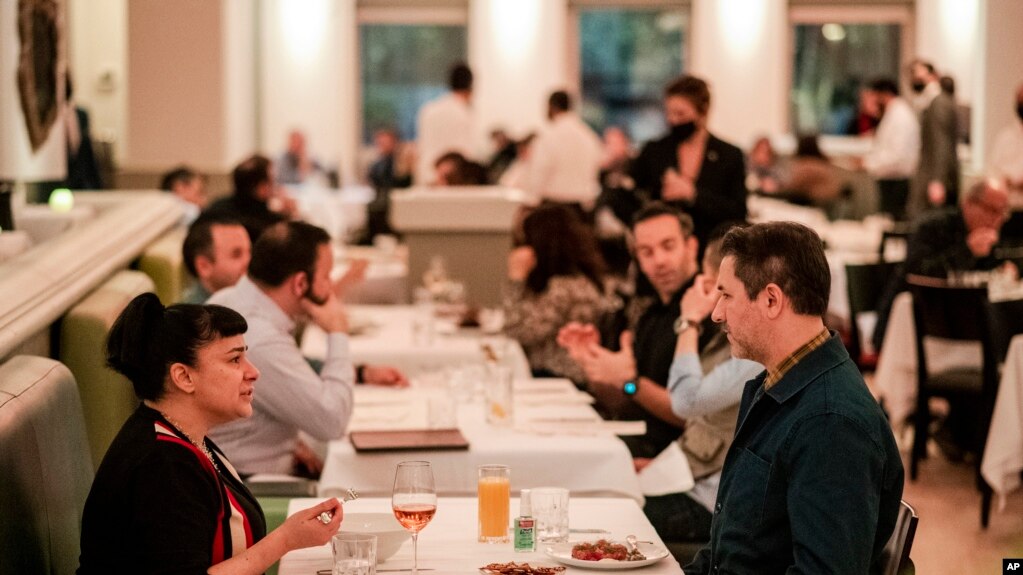Restaurant owners in the United States and Britain are worried about the future of their industry. Their reasons for concern include a labor shortage, high food costs and the Omicron version of the new coronavirus.
United States sales, costs rise
In November, the U.S. Census Bureau said that sales at restaurants and drinking places, or bars, in the United States reached an estimated $73.7 billion. That is an increase of 37 percent over the same month last year. But, the increase was partly the result of higher prices as restaurants try to deal with the cost of inflation.
Many restaurant owners are concerned about the future of the industry in the coming months. Caroline Glover is the owner of the restaurant Annette near Denver, Colorado.
Glover described her feelings as “extremely worried.” She added, “I’ve never felt like we were out of the woods.”
Out of the woods is an expression that means out of danger.

People eating at Gotham restaurant in New York City on December 14, 2021. (AP Photo/Brittainy Newman)
Glover worries about renewed restrictions if coronavirus infections increase.
For other businesses, the main concern is finding enough workers. In a recent study of 3,000 U.S. restaurant operators, 77 percent said they did not have enough workers. That information comes from the National Restaurant Association, an industry trade group.
Many restaurant workers have started new careers or have gone back to school. Jada Sartor of Grand Rapids, Michigan, said her pay increased from $10 an hour to $16 an hour this year as restaurants tried to employ more workers. But she recently quit her serving job because she could not find child care that she was able to pay for.
“The cost of living is just so high you can’t afford to really live,” she said.
Kristin Jonna is the owner of the restaurant Vinology in Ann Arbor, Michigan. She said she raised pay nearly 40 percent to get and keep her 35 workers. It was a change that needed to happen in the service industry, she said. But Jonna cannot increase restaurant prices enough to make up for the pay increase.
Food costs in the U.S. have increased, Jonna said, and skilled workers have become costly too.
“Everyone knows that beef is more expensive, but high-end, highly skilled labor is expensive, too,” she said. “That is the very tricky part of our business right now.”
Sara Lund is the owner of Bodega and The Rest, a bar and restaurant in Salt Lake City, Utah. She said the cost of materials to make food rose between 15 and 40 percent this year.
United Kingdom
In Britain, the fast spread of the Omicron version of the new coronavirus is also hurting the food industry. Restaurants, hotels, and other eating places report decreases in business at an important time of the year.
Scotland and Wales have promised millions of dollars in aid for their businesses. That has placed pressure on the government of Prime Minister Boris Johnson to do the same in England.
Patrick Dardis heads a chain of about 220 bars, or pubs, called Young’s. Dardis said he hoped officials would come up with a financial aid plan soon. About 30 percent of the chain’s planned events were canceled last week.
“There are thousands of businesses — not just pubs — that could collapse in January if the current situation isn’t partnered with proper financial support,” he said.
UKHospitality is an industry trade group in Britain. It urged reduced taxes, saying concerns about Omicron have led to the loss of $2.6 billion in sales this month.
I’m John Russell.
Dee-Ann Durbin, Mae Anderson and Sylvia Hui reported on this story for the Associated Press. John Russell adapted it for Learning English. Mario Ritter, Jr. was the editor.
_____________________________________________________________
Words in This Story
afford – v. to be able to pay for (something)
tricky – adj. difficult to do or deal with
chain – n. a group of businesses (such as stores, restaurants, or hotels) that have the same name and basic appearance and sell the same products or services
proper –adj. right or correct for some purposes or situations